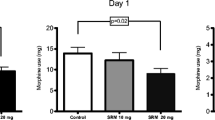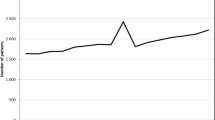Abstract
Objective
The purpose of the study was to investigate the effect of magnesium sulfate on pain management for pain after sleeve gastrectomy operation.
Design
A prospective, randomized, placebo-controlled clinical study.
Setting
University hospital.
Participants
Eighty patients undergoing sleeve gastrectomy.
Measurements and Main Results
Visual analog scale for the evaluation of pain, sedation score, mean arterial pressure, heart rate, and total analgesic consumption was recorded. Serum magnesium levels were determined before the operation, at the end of the operation, and at 24 h. There were no significant differences between the groups with respect to demographics, and sedation scores. Cumulative morphine consumption and pain scores were found to be higher in the control group than the magnesium group.
Conclusion
Perioperative use of magnesium sulfate reduced postoperative pain and opioid consumption in obese patients undergoing sleeve gastrectomy operations.


Similar content being viewed by others
References
Tufanogullari B, White PF, Peixoto MP, et al. Dexmedetomidine infusion during laparoscopic bariatric surgery: the effect on recovery outcome variables. Anesth Analg. 2008;106:1741–8.
Schug SA, Raymann A. Postoperative pain management of the obese patient. Best Pract Res Clin Anaesthesiol. 2011;25(1):73–81.
Christel AL, Raaff d, de Vries N, et al. Obstructive sleep apnea and bariatric surgical guidelines: summary and update. Curr Opin Anesthesiol. 2018;31:104–9.
Fawcett WJ, Haxby EJ, Male DA. Magnesium: physiology and pharmacology. Br J Anaesth. 1999;83:302–20.
Tramer MR, Glynn CJ. An evaluation of a single dose of magnesium to supplement analgesia after ambulatory surgery: randomized controlled trial. Anesth Analg. 2007;104:1374–9.
Koinig H, Wallner T, Marhofer P, et al. Magnesium sulfate reduces intra- and postoperative analgesic requirements. Anesth Analg. 1998;87:206–10.
Mentes O, Harlak A, Yigit T, et al. Effect of intraoperative magnesium sulfate infusion on pain relief after laparoscopic cholecystectomy. Acta Anaesthesiol Scand. 2008;52:1353–9.
Bhatia A, Kashyap L, Pawar DK, et al. Effect of intraoperative magnesium infusion on perioperative analgesia in open cholecystectomy. J Clin Anesth. 2004 Jun;16(4):262–5.
De Oliveria GS, Castro-Alves LJ, Khan JH, et al. Perioperative systemic magnesium to minimize postoperative pain: a meta-analysis of randomized controlled trials. Anesthesiology. 2013 Jul;119(1):178–90.
Bamgbade OA, Adeogun BO, Abbas K. Fast-track laparoscopic gastric bypass surgery: outcomes and lessons from a bariatric surgery service in the United Kingdom. Obes Surg. 2012;22(3):398–402.
Dogan K, Kraaij L, Aarts EO, et al. Fast-track bariatric surgery improves perioperative care and logistics compared to conventional care. Obes Surg. 2015;25(1):28–35.
Tsai A, Schumann R. Morbid obesity and perioperative complications. Curr Opin Anaesthesiol. 2006;29:103–8.
Escalante-Tattersfield T, Tucker O, Fajnwaks P, et al. Incidence of deep vein thrombosis in morbidly obese patients undergoing laparoscopic Roux-en-Y gastric bypass. Surg Obes Relat Dis. 2008;4(2):126–30.
Flancbaum L, Choban PS. Surgical implications of obesity. Annu Rev Med. 1998;49:215–34.
Van Mil SR, Duinhouwer LE, Mannaerts GHH, et al. The standardized postoperative checklist for bariatric surgery: a tool for safe early discharge? Obes Surg. 2017 Jun 15;27:3102–9. https://doi.org/10.1007/s11695-017-2746-y.
Kehlet H, Dahl JB. The value of multimodal or balanced analgesia in postoperative pain treatment. Anesth Analg. 1993;77:1048–56.
de Beer JDV, Winemaker MJ, Donnelly GAE, et al. Efficacy and safety of controlled-release oxycodone and standard therapies for postoperative pain after knee or hip replacement. Can J Surg. 2005;48:277–83.
Watcha MF, Issioui T, Klein KW, et al. Costs and effectiveness of rofecoxib, celecoxib and acetaminophen for preventing pain after ambulatory otolaryngologic surgery. Anesth Analg. 2003;96:987–94.
Bamgbade OA, Alfa JA. Dexmedetomidine anaesthesia for patients with obstructive sleep apnoea undergoing bariatric surgery. Eur J Anaesthesiol. 2009;26(2):176–7.
Lloret-Linares C, Lopes A, Decleves X, et al. Challenges in the optimization of post-operative pain management with opioids in obese patients: a literature review. Obes Surg. 2013;23(9):1458–75.
Bamgbade OA, Chung AS, Khalaf WM, et al. Survey of perioperative care of adults with obstructive sleep apnoea. Eur J Anaesthesiol. 2009;26(8):706–8.
Katherine KYL, Wilfred LMM. Multimodal analgesia model to achieve low postoperative opioid requirement following bariatric surgery. Hong Kong Med J. 2016;22(5):428–34.
Doufas AG, Tian L, Padrez KA, et al. Experimental pain and opioid analgesia in volunteers at high risk for obstructive sleep apnea. PLoS One. 2013;8(1):e54807.
Albrecht E, Kirkham KR, Liu SS, et al. Peri-operative intravenous administration of magnesium sulphate and postoperative pain: a meta-analysis. Anaesthesia. 2013 Jan;68(1):79–90.
Tramer MR, Schneider J, Marti RA, et al. Role of magnesium sulfate in postoperative analgesia. Anesthesiology. 1996;84:340–70.
Iseri LT, French JH. Magnesium: nature’s physiologic calcium blocker. Am Heart J. 1984;108:188–93.
Seyhan TO, Tugrul M, Sungur MO, et al. Effects of three different dose regimens of magnesium on propofol requirements, haemodynamic variables and postoperative pain relief in gynaecological surgery. Br J Anaesth. 2006;96:247–52.
Levaux C, Bonhomme V, Dewandre PY, et al. Effect of intraoperative magnesium sulphate on pain relief and patient comfort after major lumbar orthopaedic surgery. Anaesthesia. 2003;58:131–5.
Oguzhan N, Gunday I, Turan A. Effect of magnesium sulfate infusion on sevoflurane consumption, hemodynamics, and perioperative opioid consumption in lumbar disc surgery. J Opioid Manag. 2008;4:105–10.
Ozcan PE, Tugrul S, Senturk NM, et al. Role of magnesium sulfate in postoperative pain management for patients undergoing thoracotomy. J Cardiothorac Vasc Anesth. 2007;21(6):827–31.
Taheri A, Haryalchi K, Mansour Ghanaie M, et al. Effect of low-dose (single-dose) magnesium sulfate on postoperative analgesia in hysterectomy patients receiving balanced general anesthesia. Anesthesiol Res Pract. 2015;1:306145.
Rosanoff A, Weaver CM, Rude RK. Suboptimal magnesium status in the United States: are the health consequences underestimated? Nutr Rev. 2012;70:153–64.
Author information
Authors and Affiliations
Corresponding author
Ethics declarations
All procedures performed in this study involving human participants were in accordance with the ethical standards of the institutional and/or national research committee and with the 1964 Helsinki declaration and its later amendments or comparable ethical standards. Informed consent was obtained from all individual participants included in the study.
Conflict of Interest
The authors declare that they have no conflict of interest.
Rights and permissions
About this article
Cite this article
Kizilcik, N., Koner, O. Magnesium Sulfate Reduced Opioid Consumption in Obese Patients Undergoing Sleeve Gastrectomy: a Prospective, Randomized Clinical Trial. OBES SURG 28, 2783–2788 (2018). https://doi.org/10.1007/s11695-018-3243-7
Published:
Issue Date:
DOI: https://doi.org/10.1007/s11695-018-3243-7




